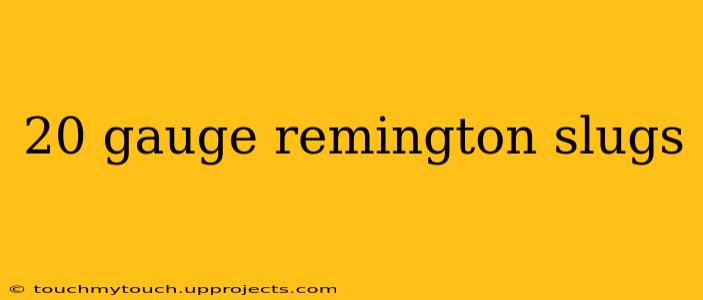The 20 gauge shotgun, while often overshadowed by its 12 gauge cousin, offers a compelling combination of manageable recoil and surprisingly potent stopping power, especially when loaded with slugs. Remington, a long-standing name in firearms, produces a variety of 20 gauge slugs, each designed for specific hunting situations and shooting styles. This guide dives deep into the world of 20 gauge Remington slugs, exploring their features, applications, and considerations for responsible use.
Understanding Remington's 20 Gauge Slug Offerings
Remington's 20 gauge slug lineup isn't as extensive as their 12 gauge selection, but they offer several options catering to different needs. While specific models and availability may vary depending on region and retailer, you'll commonly find slugs categorized by their design and intended use. These generally include:
Rifled Slugs:
- Accuracy: Rifled slugs feature a rifled design, offering superior accuracy compared to foster-type slugs. This makes them ideal for longer-range shots.
- Range: Expect greater accuracy at distances beyond what's practical with foster slugs.
- Applications: Deer hunting, target shooting at longer ranges.
Foster Slugs:
- Cost: Often more affordable than rifled slugs.
- Accuracy: Generally less accurate than rifled slugs, especially at longer ranges.
- Applications: Close-range hunting, where accuracy requirements are less demanding.
Sabot Slugs:
- Accuracy and Velocity: Sabot slugs combine the accuracy of a rifled slug with the higher velocity often associated with lighter projectiles. This combination can extend effective range.
- Applications: Deer hunting at longer ranges, where precision is paramount.
Note: Always consult the specific product packaging and Remington's official documentation for detailed specifications on projectile weight, muzzle velocity, and recommended applications for each slug type.
Choosing the Right Remington 20 Gauge Slug
Selecting the appropriate slug depends heavily on your intended use:
- Hunting: For deer hunting, rifled or sabot slugs are preferred for their increased accuracy at hunting ranges. Consider the legal requirements and ethical hunting practices in your area, as regulations regarding slug type and hunting distances can vary significantly.
- Target Shooting: For target practice, rifled slugs provide predictable ballistics and superior accuracy at longer distances. Foster slugs can be suitable for closer-range practice, offering a cost-effective option.
- Home Defense (Situational): While shotguns are sometimes used for home defense, the use of slugs in a home environment presents significant risks due to overpenetration. Buckshot or birdshot are generally safer options for home defense.
Crucial Note: Always prioritize safety. Understand your firearm, ammunition, and the environment before handling or discharging any firearm.
Factors to Consider Beyond Slug Type
Besides the slug itself, several other factors influence performance:
- Choke: The choke of your shotgun barrel significantly impacts slug patterning and accuracy. A tighter choke generally provides better accuracy with slugs, but this may vary depending on the specific slug design.
- Barrel Length: Longer barrels tend to yield higher velocities and improved accuracy.
- Sight System: Proper sighting equipment is crucial for accurate shooting, especially at longer ranges. Consider using a scope or ghost ring sights for improved precision.
Conclusion: Responsible Use of Remington 20 Gauge Slugs
Remington offers a selection of 20 gauge slugs to meet various needs. Understanding the distinctions between slug types, and the influence of barrel choke and sighting systems, is key to maximizing performance and ensuring safe handling. Remember, responsible gun ownership includes thorough knowledge of your firearm, ammunition, and relevant safety regulations. Always prioritize safety and ethical considerations in your shooting activities.
